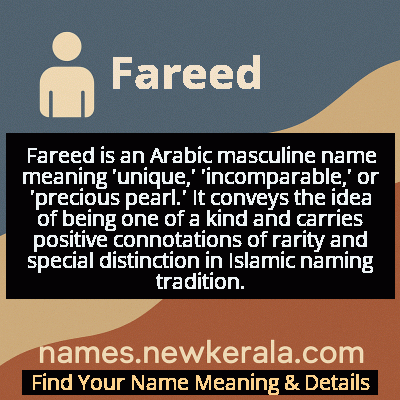Fareed Name Meaning & Details
Origin, Popularity, Numerology Analysis & Name Meaning of Fareed
Discover the origin, meaning, and cultural significance of the name FAREED. Delve into its historical roots and explore the lasting impact it has had on communities and traditions.
Name
Fareed
Gender
Male
Origin
Muslim
Lucky Number
3
Meaning of the Name - Fareed
Fareed is an Arabic masculine name meaning 'unique,' 'incomparable,' or 'precious pearl.' It conveys the idea of being one of a kind and carries positive connotations of rarity and special distinction in Islamic naming tradition.
Fareed - Complete Numerology Analysis
Your Numerology Number
Based on Pythagorean Numerology System
Ruling Planet
Jupiter
Positive Nature
Optimistic, inspirational, and creative.
Negative Traits
Scattered, exaggerating.
Lucky Colours
Yellow, gold, purple.
Lucky Days
Thursday.
Lucky Stones
Yellow sapphire.
Harmony Numbers
1, 2, 9.
Best Suited Professions
Arts, writing, communication.
What People Like About You
Creativity, optimism.
Famous People Named Fareed
Fareed Zakaria
Journalist and Author
Host of CNN's Fareed Zakaria GPS and renowned international affairs analyst
Fareeduddin Masood
Islamic Scholar
Prominent Pakistani Islamic scholar and religious teacher
Fareed Ayaz
Qawwali Singer
Renowned Pakistani Qawwal preserving and promoting classical Sufi music
Fareed al-Din Attar
Poet and Sufi Mystic
Author of 'The Conference of the Birds,' one of Persian literature's masterpieces
Name Variations & International Equivalents
Click on blue names to explore their detailed meanings. Gray names with will be available soon.
Cultural & Historical Significance
In many Muslim communities, naming a child Fareed expresses the parents' hope that their child will grow to be exceptional and make unique contributions to society while maintaining strong Islamic values. The name carries with it expectations of leadership, wisdom, and moral integrity. Throughout Islamic history, the concept of 'fareed' has been closely tied to the idea of being chosen or special in God's plan, making it a name that conveys both privilege and responsibility. This cultural significance has ensured its enduring popularity across generations and geographic boundaries within the Muslim world.
Extended Personality Analysis
Individuals named Fareed are often perceived as independent thinkers with a strong sense of individuality. They tend to be analytical, thoughtful, and possess a natural curiosity that drives them to seek knowledge and understanding. Their 'unique' nature manifests in creative problem-solving abilities and unconventional approaches to challenges. Many Fareeds display leadership qualities combined with humility, often becoming respected figures in their communities without seeking the spotlight.
These individuals typically value deep, meaningful relationships over superficial connections and are known for their loyalty to those they trust. Their thoughtful nature can sometimes be mistaken for aloofness, but in reality, they are deeply contemplative individuals who prefer substance over appearance in all aspects of life. Fareeds often exhibit a balanced combination of traditional values and progressive thinking, making them effective bridges between different generations and perspectives. They tend to be persistent in their pursuits but flexible in their methods, understanding that unique problems often require unique solutions. This blend of characteristics makes them well-suited for roles requiring both innovation and integrity.
Modern Usage & Popularity
In contemporary times, Fareed remains a popular choice among Muslim families worldwide, particularly in South Asia, the Middle East, and Muslim diaspora communities. While not among the most common Muslim names, it maintains steady usage due to its elegant sound and meaningful connotation. The name has gained international recognition through prominent figures like Fareed Zakaria, which has increased its appeal among educated, globally-minded Muslim parents. In recent years, there's been a slight resurgence in its popularity as parents seek names that are both traditional and distinctive, balancing cultural heritage with individual uniqueness. It's particularly favored by families valuing education and intellectual achievement, and its usage spans across various socioeconomic backgrounds while maintaining its association with refinement and distinction.
Symbolic & Spiritual Meanings
Symbolically, Fareed represents the concept of rarity and preciousness, much like a unique pearl among ordinary stones. It embodies the Islamic principle that each individual has a special purpose and unique qualities bestowed by God. The name carries connotations of excellence, distinction, and being set apart for a higher purpose. In metaphorical terms, it suggests someone who stands out not through loudness or aggression, but through the quiet confidence of their unique capabilities and character. It symbolizes the idea that true value lies in being authentically oneself rather than conforming to societal expectations, reflecting the Sufi concept of finding one's unique path to spiritual fulfillment while maintaining connection to universal truths and community values.

